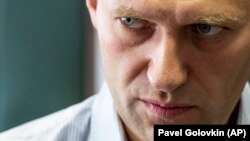In less than two weeks, the Russian opposition will head into three days of nationwide voting without its best-known, most media-savvy tactician: 44-year-old activist-blogger-politician Aleksei Navalny, now comatose in a Berlin hospital from a reported Novichok nerve-agent poisoning.
With no prognosis yet for Navalny's recovery, Russians have begun to debate who, if anyone, can or will replace him to rally opposition voters at Russia’s September 11-September 13 polls.
The voting, which concludes on September 13, includes elections for 20 governors (18 by direct vote, two through regional parliaments), 11 regional legislatures, and 22 city councils. Four districts will also hold by-elections for the State Duma.
Russian commentators generally refer to the vote as a dress rehearsal for Russia’s 2021 parliamentary elections; another chance for the country’s fragmented opposition to chip away at Russian President Vladimir Putin’s hold on power.
It will also be an opportunity for Navalny’s Smart Voting e-initiative, which contacts participants shortly before votes with the names, based on polling research, of individual opposition candidates believed most likely to defeat pro-government candidates at the polls.
In September 2019, the project contributed to the ruling United Russia party losing 13 of its seats or those of deputies it backed in Moscow’s 45-member Duma or city council, analysts believe.
“Navalny could repeat that very same feat in the Duma elections, in federal elections,” commented political consultant Abbas Gallyamov, an ex-speechwriter for Russian President Vladimir Putin.
The Smart Voting campaign made Navalny “really dangerous” for the Kremlin, Gallyamov continued.
But whether that campaign will prove as effective without Navalny is now open to debate.
Unlike in 2019, the Smart Voting list this year is not just a grab bag of Communists, Social Democrats, and liberal, pro-Western candidates. It will include candidates who have entered into a formal coalition with the activist’s movement.
“In fact, the ‘Smart Voting’ this year is voting for Navalny's list,” commented Russian political strategist Konstantin Kalachev to RFE/RL’s Russian Service.
Yet without the activist’s “personal authority and media resources,” conjectured Aleksandr Pozhalov, research director at the independent, Moscow-based Institute of Socio-Economic and Political Research, voters could question some of the choices for Smart Voting candidates.
Further, he added, in an August 28 commentary for Expert Online, Navalny’s permanent absence could lead to “internal problems and schisms for the opposition” like those that followed the 2016 murder of opposition leader Boris Nemtsov before Russia’s last parliamentary election campaign.
Three Navalny allies occasionally floated in Russian media as potential substitutes – attorney Lyubov Sobol, who gained international media exposure during the 2019 Moscow protests; politician Dmitry Gudkov, a former Duma deputy; and Moscow district council chairman Ilya Yashin – lack the strong grassroots presence outside of Moscow needed to mobilize and coordinate the opposition, he indicated.
But Vladimir Milov, an economic commentator and former deputy energy minister now substituting for Navalny’s one-man shows on YouTube, rejected as “incredible nonsense” the notion that Navalny had built up an organization centered solely on his own leadership.
“[W]e all know what to do, we all prepared specially for the fact that they can, as in previous years, preventively remove Navalny somewhere from the [public’s] field of vision …” Milov commented to RFE/RL’s Russian Service. “We know what to do when Aleksei cannot personally participate. He announced it all. The entire plan already exists. We all just have to do our work.”
Without elaboration, Navalny regional-headquarters’ manager Leonid Volkov told Reuters that the activist’s movement intends “to compensate for his temporary absence so that smart voting wins.”
The influential media platform for Navalny’s investigations still functions. His Navalny Live! YouTube channel boasts 1.95 million subscribers and is regularly updated.
The activist’s website also continues to unveil video reports from his August campaigning trip through Siberia; the most recent, from Tomsk, alleges that payments to the city for electricity, water, or trash services go to support politicians from the ruling United Russia party.
His recently shuttered Anti-Corruption Foundation will continue its investigations, the organization’s director, Ivan Zhdanov, has pledged.
Foundation employees, though, recently have reportedly come under intense police scrutiny in the region of Tatarstan while pursuing one such investigation.
Two men in civilian clothes, suspected Interior Ministry employees, were filmed on September 2 putting Foundation lawyer Vladlen Los into an unmarked car in the regional seat, Kazan. The police deny all knowledge of Los’ whereabouts, according to Georgy Alburov, head of the Foundation’s investigations.
Alburov tweeted on the previous day that police had confiscated a drone and other technical equipment that the Foundation was using for an investigation in Tatarstan after a car blocked the vehicle in which his group was riding.
Police do not appear to have responded to these reports.
Protest Apologia, a non-profit group that defends detained protesters, attributes these incidents -- and the severe recent beating of opposition blogger Yegor Zhukov in Moscow -- to an uptick in civic activism ahead of Russia’s September 11-13 vote.
“Elections always increase the risks,” commented Aleksei Glukhov, the organization’s head.
Some opposition supporters, though, cannot even get on the ballot. As of September 3, over 300 complaints had been filed with the non-governmental election watchdog Golos (Voice or Vote) about refusals to register potential candidates, defamation campaigns against those rejected, and alleged voter intimidation and bribery.
Against this backdrop, to mobilize voters against the government, former Putin advisor Gleb Pavlovsky advised in a discussion with RFE/RL’s Russian Service, that Navalny’s movement should capitalize on the “energy” that comes from the public realizing that an attempt was made “to kill” Navalny.
Gallyamov, the former Putin speechwriter, predicts an increased protest vote, but believes that only Navalny’s death, an undesirable event, could make a major difference in that regard.
“Then, yes, there really will be a massive protest,” he said. “For now, everything will go on in the same sluggish way as before.”





Facebook Forum